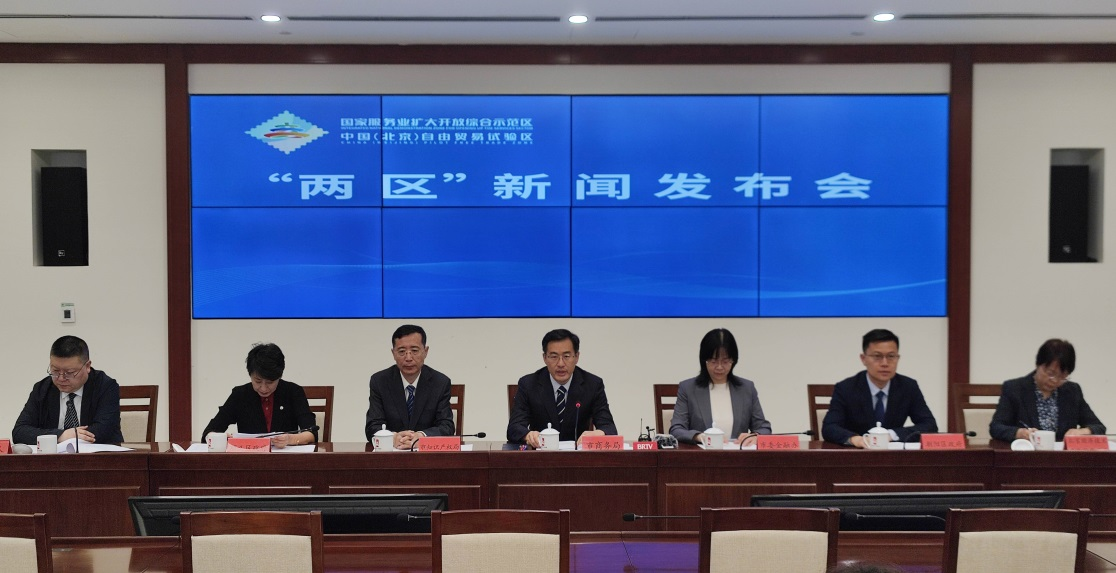
A press conference on the “two zones” was held on May 22. Photo by Beijing Municipal Commerce Bureau
BEIJING, May 22, www.chinanews.com (Reporter: Lyu Shaowei) - From January to April this year, Beijing’s “two zones” attracted 3,098 reserved projects, 1,936 of which were implemented, involving a total investment of 840.9 billion yuan.
This was announced at a press conference on the “two zones”.
Guo Wenjie, Member of the Party Leadership Group and Deputy Director General of the Beijing Municipal Commerce Bureau, said that, at the end of last year, the State Council approved the Work Plan to Support Beijing in Pursuing the Initiative for the National Comprehensive Demonstration Zone for Further Opening Up the Service Sector (hereafter referred to as the 2.0 plan), which marks the second phase of the “two zones” development. Since the beginning of this year, Beijing has been advancing the implementation of all tasks under the 2.0 plan to enhance synergy among various factors and propel the capital’s opening-up to new heights.
Introducing about 30 integrated institutional innovations
Beijing has issued the work priorities for the “two zones” initiative for the year 2024 and developed a “7+7” implementation program for the 2.0 plan. The program focuses on seven free trade precincts including Haidian and Chaoyang, and seven key sectors including finance. Through a bottom-up approach and cross-department collaboration, around 30 integrated institutional innovations have been carried out. Policy consultations in the low-altitude economy and other strategic emerging industries helped foster a multi-tier institutional innovation landscape. The city is expanding its opening-up in key service sectors and introducing new elements in opening up the financial sector. It has received approval to expand the pilot program of high-level opening-up policies for cross-border trade and investment. Additionally, Beijing has supported the China Beijing Green Exchange in establishing a unified national trading center for China Certified Emission Reduction (CCER) and initiated the country’s first pilot project for the standardization of ESG data evaluation services in the financial sector. Standard Chartered Securities, China’s first new wholly foreign-owned subsidiary, and Mastercard Netsunion, the nation’s second joint venture bank card clearing institution, has started operation.
Nine government departments, including the Beijing Municipal Medical Insurance Bureau, jointly released the Measures to Support the High-Quality Development of Innovative Medicine in Beijing (2024). The proposal includes 32 measures across eight areas, such as expediting the review and approval of innovative medicine and medical devices. The Beijing Medicine and Medical Device Innovation Service Stations, established in Changping District and E-Town, have served enterprises more than 800 times. All these efforts have attracted the regional headquarters of Varian Medical Systems, a multinational corporation, as well as other landmark projects to settle in Beijing.
Improving regulations in the digital economy sector
To promote and regulate cross-border data flows, Beijing has formulated a “negative list” for outbound data transfer in the pilot free trade zone. Additionally, it has implemented fast-track security assessments for foreign-invested companies seeking to transfer data abroad. This program has benefited over 110 companies across five industries, i.e., automobile, medicine, civil aviation, retail, and artificial intelligence (AI), resulting in an average 50% reduction in the time required for security assessments. Moreover, China’s first security assessment case for the outbound data transfer by foreign-funded bio-pharmaceutical enterprises was approved in Beijing. The launch of the regulatory sandbox in the AI data training base also marks China’s first AI regulatory sandbox.
In the high-end industries section, Beijing is advancing the development of its High-Level Autonomous Driving Demonstration Area and has launched the world’s first autonomous shuttle service between the airport and urban areas in capital cities. Additionally, there is significant progress in commercial aerospace, with private rocket R&D and manufacturing firms in Beijing accounting for over 75% of the national total. In the first quarter, paid-in foreign investment in the pilot free trade zone accounted for 28.5% of the city’s total, marking a 9.2-percentage-point increase from the end of last year. Enterprises above designated size achieved a growth rate which was 2.7 percentage points higher than the city’s average. All these achievements show that high-level opening-up is a more effective way to boost high-quality development. Innovation, digital intelligence, green development, convenience, and collaboration have become the defining features of the free trade zone.
Striving to basically implement the 2.0 plan by year’s end
Guo Wenjie stated that Beijing will accelerate the implementation of the 2.0 plan, aiming to cover all tasks by the end of the year. The city will focus on integrated institutional innovations such as establishing an international commercial arbitration center and advancing multi-departmental regulation on cutting-edge biomedicine sectors. All efforts will be underpinned by coordinated planning and actions, prioritizing institutional innovations that directly address enterprise demands, such as the export of low-earth orbit satellites. Beijing will strive to create smooth implementation pathways so that institutional innovation can better serve high-quality development.
Coordinated efforts will be made to advance the development of various platforms, including pilot free trade zone precincts and key industrial parks of the “two zones” initiative. Specifically, the city will strengthen the evaluation of industrial parks to enhance their efficiency and quality, with an aim to attract more high-quality entities in the value chains and foster competitive and distinctive industrial clusters.
Beijing will continue to leverage mechanisms such as round-tables for foreign-funded enterprises and policy interpretation sessions for the “two zones” “Close Partners” program to help enterprises understand policies and tackle challenges. Simultaneously, the city will stimulate greater market vitality through more pioneering and leading institutional innovations.


